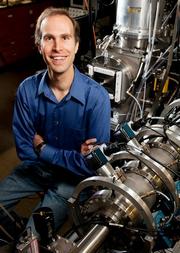
 |
| Thursday, April 19, 2012 Meeting |
|---|
| Ben McCall |  |
| Associate Professor of Chemistry and Astronomy University of Illinois at Urbana-Champaign |
|
“Astrochemistry: From H3+ to C60 ” |
|
Date: Thursday, April 19, 2012 Location: Viceroy of India
233 E. Roosevelt Road (at Highland Ave.)
Lombard, IL 60148
(630) 627-4411
Cost: $30.00 for members of ACS and their guests, $32.00 for non-members,
$15 for students, retired, or unemployedDinner reservations are required and should be received in the Section Office via phone (847-391-9091), email (chicagoacs@ameritech.net), or web by noon on Tuesday, April 17. PLEASE HONOR YOUR RESERVATIONS. The Section must pay for all food orders. No-shows will be billed. Seating will be available for those who wish to attend only the meeting.
Please REGISTER ON LINE
5:00 - 6:00 PM · Job Club
5:30 - 6:30 PM · Social Hour
6:30 - 7:30 PM · Dinner
7:30 PM · Featured Program
Topic: “Astrochemistry: From H3+ to C60 ”
Abstract: Our galaxy’s interstellar medium contains roughly 1016 more molecules than the Earth, and over 150 different interstellar molecules have been definitively identified by high resolution spectroscopy. However, our inventory of this vast chemical repository remains very incomplete, and our understanding of the chemical and physical processes that produce and destroy these molecules remains primitive.
Our group is engaged in an interdisciplinary program of laboratory experiments and astronomical observations aimed at answering some of the key unsolved questions in “astrochemistry.” In this talk, I will describe how our observations of H3+ (the simplest polyatomic molecule) have revealed the presence of a large flux of low energy cosmic rays in diffuse interstellar clouds. I will also present our laboratory measurements of the most common bimolecular reaction in the universe (H3+ + H2 → H2 + H3+) and the simplest electron recombination process for a polyatomic molecule (H3+ + e- → products), and discuss how these processes determine the ortho:para ratio of H3+ in these clouds. I will describe our development of two new laboratory techniques for molecular ion spectroscopy: cavity-enhanced velocity modulation spectroscopy (CEVMS) and sensitive, resolved, cooled ion beam spectroscopy (SCRIBES), which we expect will ultimately enable the astronomical detection of more complex molecular ions. Finally, I will report on our search for the first rotationally-resolved spectrum of C60, the largest and most symmetric molecule to be studied with high-resolution spectroscopy.
Professor McCall received his B.S. degree in Chemistry from the California Institute of Technology in 1995 and a joint Ph.D. in Chemistry and Astronomy & Astrophysics from the University of Chicago in 2001. He was then a postdoctoral fellow at the University of California at Berkeley. He joined the University of Illinois faculty as an Assistant Professor in 2004.
He has received multiple awards, including, in part: being named a Helen Corley Petit Scholar; a Camille Dreyfus Teacher-Scholar Award; a Dean's Teaching Fellowship; a Sloan Research Fellowship; a Coblentz Award; a Cottrell Scholar Award; an Air Force Young Investigator Award; a David and Lucile Packard Fellowship; a Presidential Early Career Award for Scientists and Engineers (PECASE); an NSF Career Award and being named a Miller Research Fellow.
The realm of most traditional areas of chemistry is the Earth, which consists of "only" ~1050 molecules. However, there are ~1066 molecules in the Milky Way galaxy, which makes the study of Earth's chemistry seem like a small part of the overall picture. His research is in the emerging field of "astrochemistry," the study of molecules of astronomical importance and is focused in the areas of molecular ion spectroscopy, investigation of the structure of carbocations and observational astrochemistry.
Parking: Free parking is available
Buffet style -- Butter Chicken (chicken barbequed in clay oven and cooked in a sauce made from onions, tomatoes and various herbs), Palak Panner (spinach cooked with cubes of homemade cheese. A north Indian staple), Dal Makhani (a black lentils dish), Eggplant Bhartha (eggplant cooked with onions, tomatoes, garlic and many herbs and spices), Lamb Curry (lamb cooked in a tasteful mild onion and tomato gravy), Nan Bread (leavened bread), Peas Pulao Rice (special basmati rice cooked to perfection and lightly sautéed with peas and cumin), Salad, Yogurt dish;
Desserts: Mango Kulfi (special Indian ice cream made with mangos) and Gulab Jamun (golden brown dumplings made from semolina and dry milk and served in sweet syrup);
| Last updated 4/2/12 Copyright © 2009-2012, Chicago Section, The American Chemical Society |
Webs by Wizardcraft |